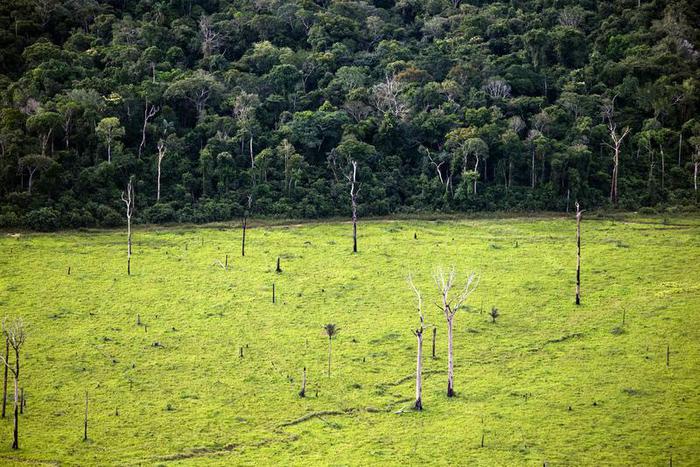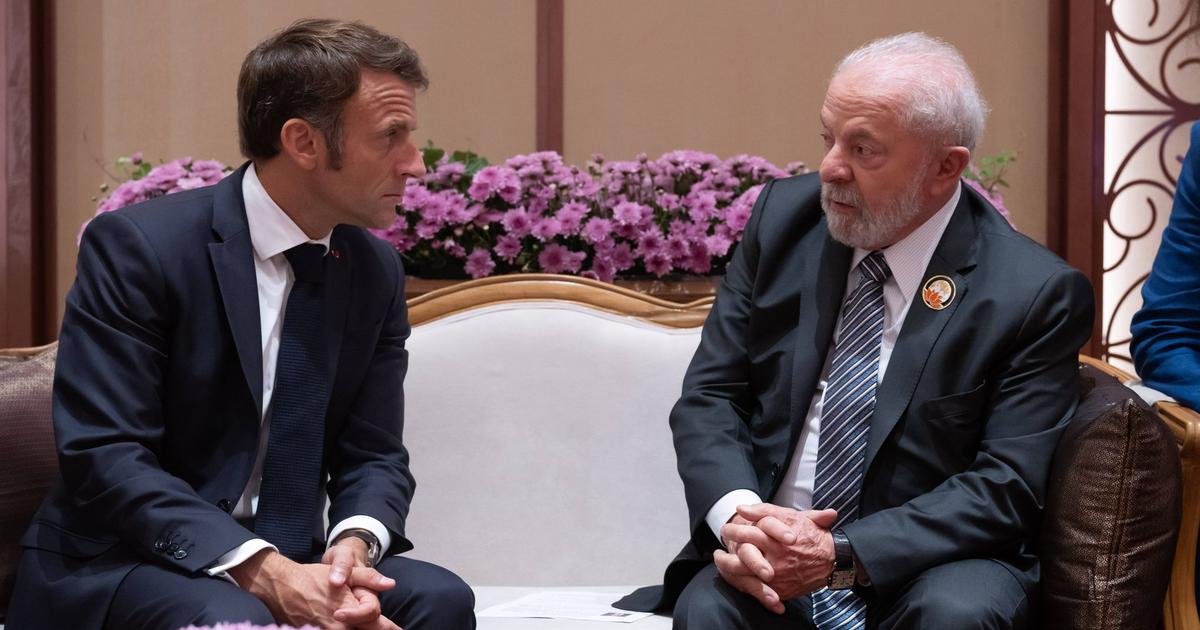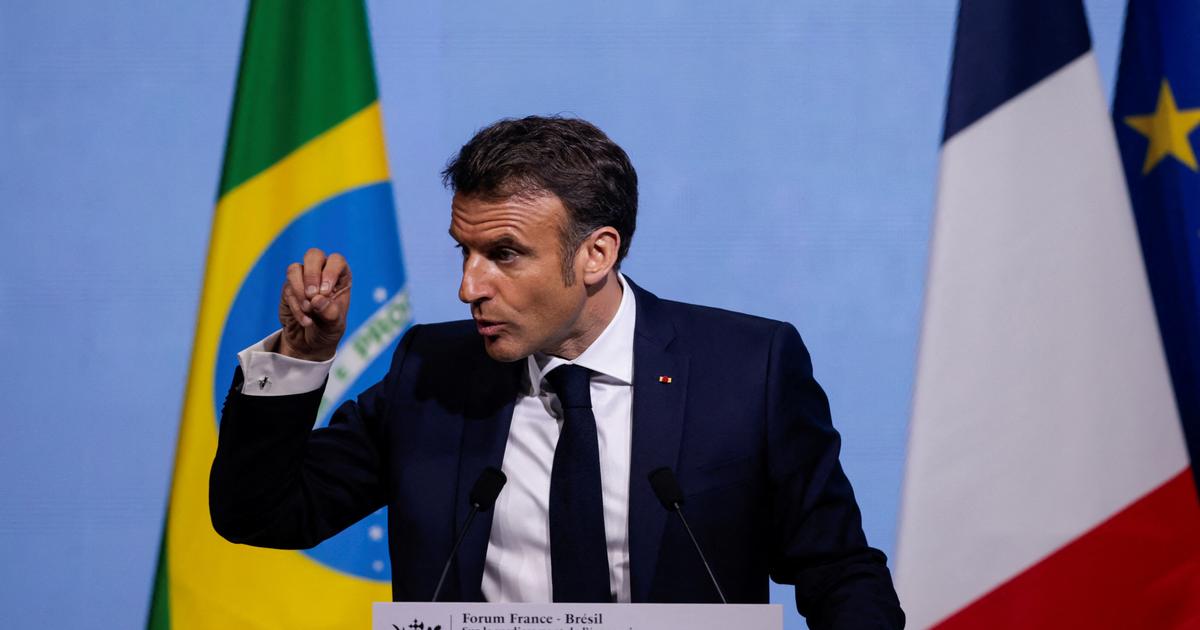Brazil: fateful choice for the climate
Created: 09/30/2022, 17:07
By: Lisa Kuner
The photo of a deforested area for the cultivation of soy shows the explosiveness of the climate election in Brazil.
© Imago
The Brazil election will be trend-setting in many aspects.
One of them is how to proceed with climate protection - not only in the Amazon region.
Mato Grosso/Brazil – Huge forest fires that are spreading rapidly and clouds of black smoke in the sky: we have been seeing these images from the Brazilian Amazon region on television for four years.
In 2021 they reached the highest level in the past 15 years - in 2022 there were already more fires in the first nine months than in the whole of 2021.
Deforestation in Brazil has risen sharply under the current right-wing populist President Jair Bolsonaro.
On Sunday, the Brazilians will vote - the top candidates are Bolsonaro and former President Luiz Inácio "Lula" da Silva.
Whether Bolsonaro is reelected or voted out has a major impact on the climate and environment.
In a new term of office, he would probably continue to do the same as before.
The extent of the destruction would continue to be gigantic.
Brazil: Intensive agriculture and monoculture
Change of location: The Brazilian state of Mato Grosso (German: big forest) is almost three times the size of Germany.
The southern foothills of the Amazon rainforest extend to the north of Mato Grosso, to the south are the species-rich savannahs of Cerrado and then the Pantanal biodiversity reserve.
Here you can see what is happening to the formerly wooded area.
More than 50 percent of the Cerrado has already been deforested.
Two different crops are grown on huge plantations each year.
For the one harvest in the drier half of the year, this is mostly corn or cotton, and in the second half of the year the main product is soy.
At the end of September the areas are fallow, the next soybean sowing will begin in a few weeks with the onset of the rainy season.
The problems caused by these huge plantations are manifold.
On the one hand, the loss of forest cover is a threat to biodiversity and the climate, on the other hand, these monocultures only thrive through the use of large amounts of pesticides and fertilizers.
Brazil: Pesticides in a sensitive ecosystem
Huge soy plantations have not only existed since the current President Jair Bolsonaro was in power.
But under him they increased by leaps and bounds.
The Brazilian president is known for making policies for agribusiness and for wanting to listen to big farmers.
For example, record numbers of new pesticides were approved.
The scientist and activist Solange Ideka lives and works in Cáceres, a town at the beginning of the Pantanal and near the Bolivian border.
"This ecosystem here is very sensitive," she explains in an interview with
Frankfurter Rundschau
from IPPEN.MEDIA.
From their point of view, the many agricultural activities and the use of pesticides near the source of the rivers in the Pantanal endanger this.
"Nevertheless, there is more and more large agribusiness here," she explains.
And the soy fields are getting closer and closer to the Pantanal.
Bolsonaro government in Brazil: Structural destruction of environmental policies
"Regression, destruction and incompetence - these are the three things that the Bolsonaro government is leaving us in terms of climate policy," says Izabella Teixeira in an interview.
She was Minister of the Environment in one of the previous governments of Lula and under Dilma Rousseff, and today she advises various actors in climate policy.
She is currently working on Lula's campaign program.
From their point of view, Bolsonaro has structurally switched off all mechanisms for climate and environmental protection.
On the one hand, the government has both weakened scientific institutions and cast doubt on their findings.
Research funds have been cut at universities, and Bolsonaro and other members of the government have regularly questioned man-made climate change.
also read
"Our value is the love of people": Putin announces Ukraine annexation in wild speech
Ukraine formally applies for NATO membership
In addition, civil society has been excluded from many climate policy processes.
This is fundamentally problematic, but what is particularly bad is that indigenous communities are no longer included.
In addition, Izabella Teixeira believes that Brazil under Bolsonaro has withdrawn more and more from international climate cooperation.
About IPPEN.MEDIA:
The IPPEN.MEDIA network is one of the largest online publishers in Germany.
At the locations in Berlin, Hamburg/Bremen, Munich, Frankfurt, Cologne, Stuttgart and Vienna, journalists from our central editorial office research and publish for more than 50 news offers.
These include brands such as Münchner Merkur, Frankfurter Rundschau and BuzzFeed Germany.
Our news, interviews, analyzes and comments reach more than 5 million people in Germany every day.
stop deforestation
Adriana Abdenur is the founder and managing director of the think tank Instituto Cipó, which researches international climate policy.
She draws attention to another point.
Under the Bolsonaro government, public environmental protection bodies were also weakened.
She cites as examples the environmental protection authority IBAMA, the indigenous protection organization Funai and the Institut Chico Mendes, which is actually responsible for biodiversity conversation.
These public bodies now have so few resources that they can hardly function properly.
"With all this, Brazil has completely lost its international credibility in terms of climate protection," says Abdenur.
It must be rebuilt in the years to come.
Greener electoral program
Both Abdenur and Teixeira have hope that a government under a possible President Lula will be able to address the challenges of climate and environmental crises.
"Lula is an experienced politician," says Teixeira.
He recognized how important it was to protect the Amazon region.
In addition, the pressure on him is also increasing: in the last few weeks of the election campaign, Lula also received support from Marina Silva, also a former environment minister.
Her condition for supporting Lula was improvements in his environmental program.
For example, his election manifesto now includes much stronger commitments to lower-emission agriculture and the recognition of indigenous lands.
As long as Ideka from Cáceres hopes that a constructive dialogue will at least be possible again with a new president.
And that, unlike Bolsonaro, he does not deny or question scientific findings.
From their point of view, that would be a big step forward.














